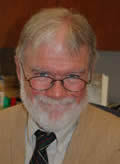
As Stanley Hauerwas once observed, “We assume that being modern involves at least agreement that no one ought to take religion too seriously, especially if it is going to ask any real sacrifices from us. . . . Any idea that religious convictions might challenge our deepest beliefs about ourselves or ask us to make extraordinary sacrifices is simply unthinkable.”
The observation was made in a 1978 essay, when Hauerwas was teaching theology at Notre Dame. He was talking about the conventional reaction to recent events in Jonestown, Guyana, where more than 900 religiously devout Americans had ingested cyanide-laced fruit drink in a communal act of what many of them “revolutionary suicide.” It was at the time the largest ever loss of American lives in an unnatural disaster.
At the Tuesday, April 12, afternoon at a meeting sponsored by the Kroc Institute for International Peace Studies in Notre Dame’s McKenna Hall, that baffled and baffling encounter between those who do and those who do not take religion seriously was very much on everyone’s mind.
In the nearly half century elapsed since Time magazine had proclaimed the triumph of secularism in its famous cover story, “Is God Dead?” Catholic Poles, re-energized by the papal election of one of their countrymen, had toppled a Communist regime, beginning the disintegration and collapse of the Soviet Union; a convulsion in Islam had set off the Iranian revolution of 1979 and rearranged the politics of the Middle East and the world; and 19 unquestionably devout young Muslim men had used hijacked airliners to kill 2,977 American civilians in what their leader called a “holy war,” more than tripling Jonestown’s religious butcher bill.
And only one day before the Notre Dame meeting, a new French law came into effect, clearly aimed at that country’s 6.5 million Muslims, proscribing traditional burqa garments and face-covering niqabs in public spaces.
“Religion,” as Daniel Philpott, associate professor of political science and peace studies at Notre Dame put it, “is not going away.”
He said this during a panel discussion, “God’s Century: Resurgent Religion and Global Politics,” whose participants included two authors of an eponymous book, Philpott and Timothy Samuel Shah, associate director of the Religious Freedom Project at the Berkley Center for Religion, Peace, and World Affairs, along with Mark Noll, Francis A. McAnaney Professor of History at Notre Dame.
Shah, speaking of global cultural and political forces prevailing for most of the 20th century, spoke of the “secularization thesis,” the conventional wisdom that politically ascendant revolutionaries and statesmen — the Castros, Ben-Gurions, Nassers and Shahs — for the most part espoused, embodied and drew upon secular worldviews with roots in the 18th century Enlightenment. “Religion was for a time put on the defensive,” he said. Imams, monks, clerics and faithful, those figures of a moribund past, were doomed to historical irrelevance.
No more, Philpott reminded the gathering, citing grim statistics which revealed that religion’s contribution to recent bloodshed worldwide has not been limited to jihadi terrorism and suicide bombing. Of the numerous civil wars that have raged around the world since 1940, for example, nearly half had conspicuous religious components, and those wars tended to be more deadly to noncombatants than those animated by more secular aims.
Nevertheless, far from endorsing Christopher Hitchens’ provocative and sweeping assertion that “religion poisons everything,” Philpott also spoke of religion’s equally conspicuous role in democratization, peacebuilding and reconciliation of previously warring parties. As an example he cited the mediating role played by the Catholic Community of Sant’Egidio in ending the civil war in Mozambique. In any event, he concluded, “the question is increasingly not whether, but how religion will penetrate and shape the new century’s public life.”
The historian Mark Noll could not help but remark that the very day of this discussion on the role of religion in the 21st century was the sesquicentennial of the outbreak of the American Civil War. Noll, whose own scholarship has examined the bloodiest crisis in American history as a “fundamental disagreement . . . over what the Bible had to say about slavery,” had high praise both for the discussion and for the book which stimulated it. “‘_God’s Century_ will make its readers wiser in the things of this world,” Noll said, “and perhaps even in the things of the next.”
Somehow, as the meeting in that McKenna Hall lecture room dissolved into dozens of smaller discussions, those two worlds seemed to have drawn nearer to each other.
Michael Garvey is Notre Dame’s assistant director of public information and communication. Email him at garvey.2@nd.edu.